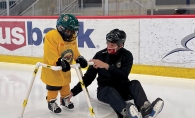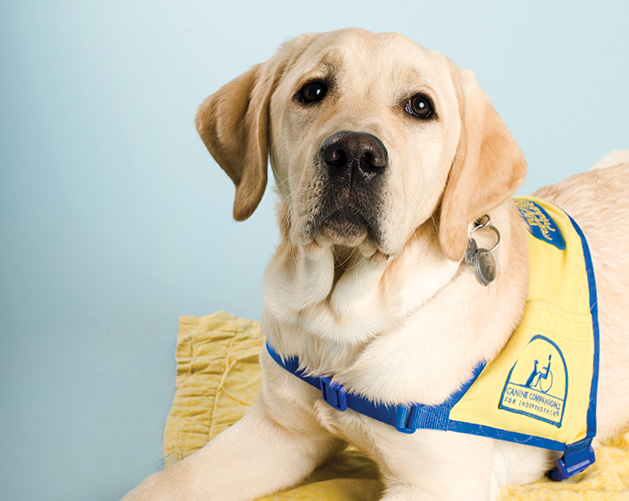
Katelyn Nichols of Edina was first introduced to Canine Companions for Independence (CCI) in 2000 when her sister received her first service dog. Her sister was born with a form of muscular dystrophy that results in spinal muscular atrophy. This meant she would be in a wheelchair for her entire life. CCI is a nonprofit organization that places professionally trained service dogs with adults, children and veterans with disabilities, free of charge.
Nichols’ sister has always had full cognitive abilities but limited mobility in comparison to an able-bodied individual “My parents did research to find out service dog options,” Nichols says. “They thought [an assistance dog] would be a great way to help her gain independence and overcome social barriers.”
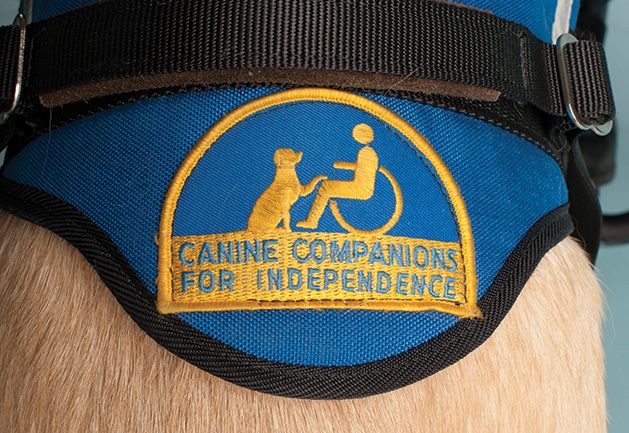
Edmund, or Eddie as the family called him, was her sister’s first service dog. Eddie was a huge help as he would retrieve dropped items for Nichols’ sister so she no longer needed to call for mom or dad. His presence in public was also a draw for other people to engage with her, thus overcoming those social barriers her parents worried about.
Eddie would aid Nichols’ sister through high school, college and graduate school. He could get laundry out of the machine and carry a shopping bag for her at the store. “Her successor dog, named Maura, helped her while she closed out law school and was also good support to her at a time when the economy was not so awesome and she was unemployed for a while,” Nichols says. Her sister is now a practicing civil rights attorney in Wisconsin.
The experience for Nichols’ family was such a positive one, Nichols wanted to give back to the organization that has helped her sister and family so much. In 2015, Nichols volunteered to become a “puppy raiser” for CCI. The organization has been providing assistance dogs to people with disabilities since 1975 and breeds Labrador retrievers, golden retrievers or some mix of the two at its headquarters in Santa Rosa, Calif. Approved puppy raisers receive their puppy at 8 weeks of age and are responsible for training the dog for a year and a half at their own expense. At that point, adolescent dogs move on to more advanced training with professionals at one of CCI’s 60 facilities nationwide. Graduate assistance dogs are placed with a graduate partner to form a working team. Nichols says CCI has placed over 5,000 dogs over the past 43 years and has volunteers and working teams in every state as well as in Canada.
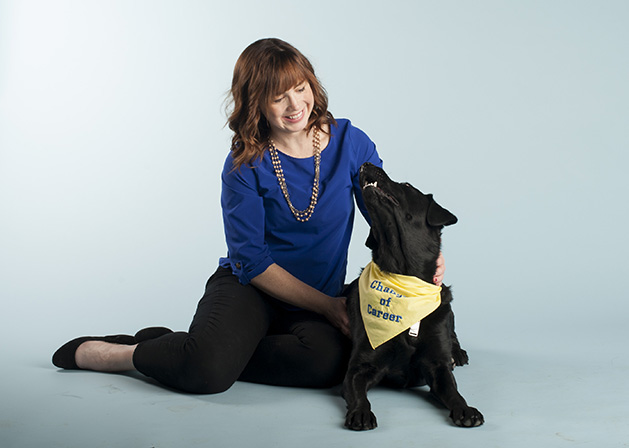
Nichols often gets asked if someone can become a puppy raiser if they already own a pet. “Yes. We had two family dogs at the time my sister received Eddie and we were familiar with pets as pet owners. In fact, we thought we had well-trained dogs, but not in comparison to these,” she says.
That’s okay. The expectation is that as long as a puppy is being trained to adhere to the required CCI standards, it doesn’t matter if your other dogs are barking or making a mess on the floor. It can also be a good thing to provide socialization to a CCI puppy by owning other animals.
During Nichols’ first time as a puppy raiser (she’s raised two so far), she didn’t have another pet in her home. But that first puppy has since become her family pet. “We like to say there are no bad outcomes,” Nichols says. “Our job is to help [the puppies] grow out of puppyhood and train them on roughly 30 commands.” When the puppies move on to an advanced training center for six–nine months, they are evaluated, their skills are refined and they are taught more advanced commands like how to turn on and off a light switch and how to tug or pull things for a person in a wheelchair. Puppies can be released at any time during advanced training. “For some, the adjustment is too stressful,” says Nichols. “It’s just not a good fit for some dogs. No one wants to force a dog into this line of work. If a dog is not well suited, they can be placed in another type of service work or adopted as a family dog.” Nichols’ first pup vocalized his stress at the advanced training center, letting everyone know he wanted to go home. Nichols’ second CCI pup moved to an advanced training center in Ohio last August. She receives monthly progress reports and so far, it seems to be going well.
Nichols has found the experience of being a puppy raiser to be both challenging and rewarding. “It’s humbling to see a dog finish training and provide that same service to others that was provided to us. It’s unreal how much I thought I knew. It’s a lot of work but it can also fit into your life,” she says.
Puppy raising has fit into her life in many ways—from being a good diversion from stress, “I’d practice our training whenever I needed a break from working on my MBA,” she says, or by gaining an opportunity to educate co-workers when she asked to bring her puppy to the office. Nichols suggests that anyone considering being a puppy raiser who wants to bring their pup to work talk to their employer first. “I lived close enough to work that I could go home during lunch to let the puppy out,” she says. Young pups don’t have the focus or patience to be at the office all day. But once the dog is 6 months old, you can slowly begin introducing them to higher stimulus environments for longer periods of time. “I approached my supervisor first and sent around a flyer with information about what I was doing,” Nichols says. “I wanted to make sure everyone was comfortable.” Then, on Fridays when more people tend to work from home, Nichols would bring her pup to work, slowly building him up until he was with her 100 percent of the time at work.
Nichols says if it weren’t for CCI, she’d never have met so many people across the metro who share her desire to give back and help others. People like Sue LeRoy in Prior Lake. LeRoy’s son received the first CCI service dog in Minn. back in 1988. Someone at the Muscular Dystrophy Association showed him a Life Magazine article about the organization and he knew a service dog was right for him. Having a service dog “changed his life,” LeRoy says. “When kids saw him in his power wheelchair with his dog, they didn’t feel sorry for him. The dog also brought him so many adventures. But mostly it was his best friend.” Part of the adventures LeRoy speaks of included a trip to Japan when a book that was written about her son and his service dog was translated into Japanese.
LeRoy’s son lived to age 28, and his dog passed before him. The value provided by the experience has led LeRoy to raise nine CCI puppies since then. It’s work. She says, “It’s like having a brand new baby. You’re awake at night and teaching them where to go to the bathroom. You bring them to obedience school. It’s a joy to teach them and provide safe boundaries for them. It’s a wonderful program that’s a life changer for the recipients and the puppy raisers.” She should know since she’s experienced both firsthand.
Maggie Wille from Richfield is on her fourth service dog. A back injury, surgery and a neurologic disease have left Wille needing help with daily activities. With a background in occupational therapy, she knew about service dogs and did some research to find a reputable organization. Having a service dog has allowed Wille to be able to work part-time since the dog can help with enough tasks that she has the energy to do more. Like for others, having a service dog has opened a lot of social doors for Wille. “People stop to talk to me about the dog,” she says. When she worked at Abbott-Northwestern Hospital, her co-workers even gave her first service dog a retirement party.
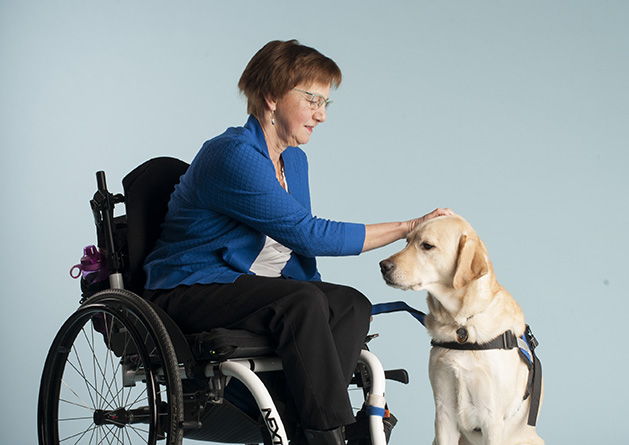
Wille now works at Amma Parenting Center in Edina and also at Hope Presbyterian Church in the area of child care. Her dog can pick up dropped items (of which there are many when working with kids), pull her wheelchair when she needs some extra “motor” power, help with her laundry and carry shopping bags. Her dog can even help with dressing and undressing, as well opening and closing doors. “They’ve all been amazing,” Wille says of her service dogs. “They are eager to work and get bored if they don’t work. I’ve never had a dog break out of focus, growl or do anything that would not be good behavior for a service dog.”
Lois Bauer of Plymouth has raised 14 puppies for CCI and is currently raising her 15th. She heard about CCI 20 years ago when she was handed a free calendar in a pet store. The calendar had 12 short stories, one each month, about how CCI dogs help people. “By spring, I realized I had to [volunteer to raise puppies] once my dog dies,” she says. Bauer’s dog would die three months later. “I made a promise and had to follow through,” she says. So she attended meetings and applied to be a puppy raiser. She received her first puppy in 2000. “It doesn’t ever get easier to say goodbye to them, not the fifth time, the tenth time and likely not the 15th time because you put your heart, soul and new carpet into it. But I know I’m making a gift for someone else,” she explains.
All of these experiences are a testament to the quality of training and commitment by CCI and its volunteers. Nichols does a lot of public speaking about CCI. She notes that there are many challenges regarding fraudulent service animals and organizations. She wants to help educate the public about what to look for and how to get connected to an organization like CCI that’s been successfully providing highly trained assistance dogs to people with disabilities for so many years. It’s these quality partnerships that offer new possibilities and opportunities to people. If you’d like to know more about how to apply for a service dog or how to become a puppy raiser, click here.
Facebook: Canine Companions for Independence
Twitter: @ccicanine
Instagram: @ccicanine








